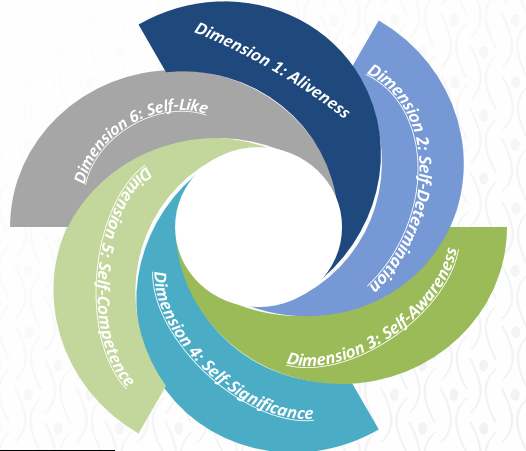Exploring the Six Dimensions of Self-Esteem
According to The Human Element, there are six measurable dimensions to Self-Esteem. The way you perceive yourself according to those dimensions represents your self-esteem. If your perception is positive, it means you have high self-esteem and vice-versa.
How you feel about yourself has a significant impact on how you interact with others. When you don’t feel good about yourself, your effectiveness falls. Your work and personal relationships suffer. It doesn’t matter what job you have because you’ll run into the same problems in practically any setting. When you feel good about yourself, you’re inspired to reach your full potential, form positive relationships with coworkers, family, and friends, and apply all of your skills and energies to my work.
The Six Dimensions of Self-Esteem

Dimension 1: Aliveness
The aliveness dimension represents how much of yourself do you include in what you are doing. Your mind is energized. You are in the here and now, strongly sensing things. You are in touch with your body. Your feelings fully feel stimulated. Your thoughts, feelings, sensations, and movements are fully engaged. Nothing is suppressed. When you are fully engaged, using your whole self, you experience what you are doing entirely. You are in a state of flow. You feel present and of added value. In that case, you sense pride in what you are doing. Hence, you feel fulfilled and valued. Your aliveness will reflect on your interactions with your colleagues and all those around you.
Dimension 2: Self-Determination
Self-determination is about being in control. Self-determination is about the power of choice. Giving yourself the ability to choose is giving yourself control, not allowing luck, fate, or coincidence to take control of you. You determine to control your own life to the extent that it is beneficial to you and comprehend the benefits you receive for creating the scenario in which you find yourself. When you are in control, you make choices for which you are responsible. You think before you act. Hence, you choose how you react towards your colleagues in various situations. You can therefore control yourself, and make sure you choose your words and actions. Thus, lower bullying levels.
Dimension 3: Self-Awareness
Self-awareness is about knowing yourself, your emotions, reactions, thoughts, behaviors, and body. The extent to which you know yourself. Self-awareness is about openness with yourself. When you are open with yourself, you allow yourself to know everything that is going on inside you. You do not censor your reflections because they do not fit with your picture of yourself. You are accepting of all the strengths and weaknesses that you discover of yourself. You understand that you are the combination of both. When you know yourself more, you can understand others. Your self-acceptance will help you accept others in return. Self-awareness, coupled with self-acceptance, will eventually lead to lower levels or fully mitigating bullying.
Dimension 4: Self-Significance
Self-significance is about feeling worthy, valued, or noticed. The more significant you feel, the higher your self-esteem. Your feeling of significance needs to stem from within to fulfill you and fill you. When you feel significant from within, you are not waiting for others to give you a feeling of importance. Therefore, you do not need to rely on others’ opinions about you to feel worthy. In addition, you do not need to bully others into fulfilling your feelings of importance and worthiness.
Dimension 5: Self-Competence
Self-competence is about believing in your capacity, intelligence, abilities, and strengths. A lack of self-competence focuses more on your weaknesses. When you lack self-competence, you do not trust your skills and do not believe in your experience. You view yourself In light of your mistakes or failures. Having self-competence means you can focus on your strengths, your successes, and achievements. When you have self-competence, you do not need to compete with others to prove your power. You do not have to push others away to win that promotion or to demonstrate your competence. You do not need to bully others into succeeding. You know you are competent.
Dimension 6: Self-Like
This dimension is about liking yourself, enjoying your own company, being kind towards yourself, and seeing yourself as worthy and deserving. Self-like is about accepting yourself. Your sense of love and deserving towards yourself will support you as you exercise self-control. You will make those choices that you feel you deserve. Liking yourself will help you appreciate and accept others. It will also help you control your non-productive or sabotaging tendencies, whether towards yourself or others.
1The Human Element, Part One, Cornerstone Participant Guide, BCon (Business Consultants, Inc)
For more about this topic, download our latest book " The Curious Case of Bullying in the Workplace " for FREE:
